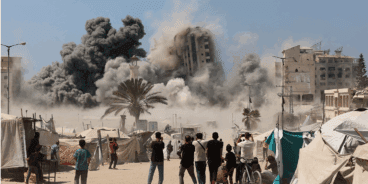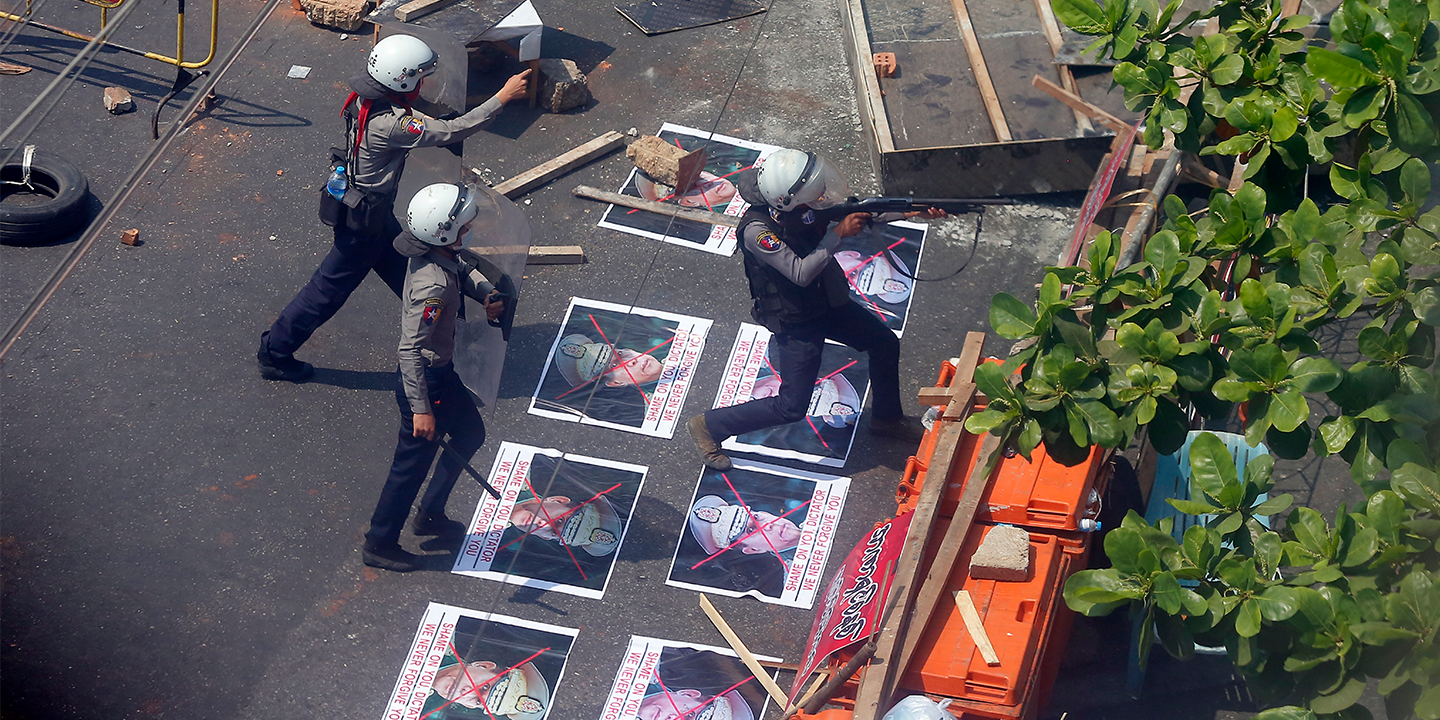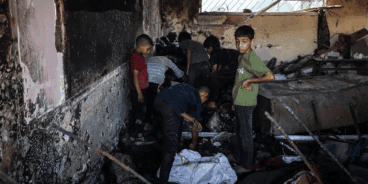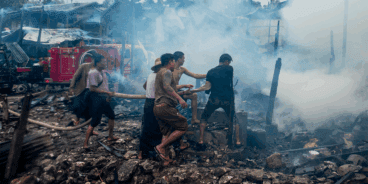

Atrocity Alert No. 308: Myanmar (Burma), Children and Armed Conflict and Syria
Atrocity Alert is a weekly publication by the Global Centre for the Responsibility to Protect highlighting situations where populations are at risk of, or are enduring, mass atrocity crimes.
MYANMAR’S MILITARY USING SURVEILLANCE TECHNOLOGY TO MAINTAIN POWER
Myanmar’s (Burma) military – the Tatmadaw – is planning to install surveillance camera systems with facial recognition capabilities in cities across all of the country’s seven states and seven regions, according to an 11 July report by Reuters. The military claims the projects will help maintain security and foster civil peace. However, recent reporting indicates that the military will increasingly rely upon surveillance technology in an attempt to strengthen its hold on power and oppose resistance efforts. This poses heightened safety risks for activists and resistance groups, including by making it easier for the military to track their movements.
Prior to the February 2021 military coup, some surveillance camera systems were already installed or planned in several major cities, including Yangon, Mandalay and Naypyidaw. Local authorities have initiated new camera surveillance projects in at least five cities around Myanmar, including Mawlamyine, the country’s fourth-largest city; Taunggyi, the capital of Shan State; and Myitkyina, the capital of Kachin State. Local firms are sourcing the cameras and other related technology from Chinese companies – Dahua, Huawei and Hikvision – that are tied to the surveillance of the ethnic Uyghur population in China.
The surveillance cameras are part of a wider effort to monitor the activities of populations in Myanmar. Last month four UN experts condemned the military’s attempts to establish a “digital dictatorship” in Myanmar with tactics like sweeping internet blackouts, digital censorship and surveillance. According to the experts, telecommunications providers have been pressured to activate surveillance technology and hand over user data to police and military officials.
Since August 2021 at least 31 townships in seven states and regions across Myanmar have reportedly experienced internet shutdowns, and an additional 23 have faced severely slowed internet speeds. The internet shutdowns have targeted areas where the military faces strong resistance from opposition groups. The UN experts said, “online access to information is a matter of life and death for many people in Myanmar, including those seeking safety from indiscriminate attacks by the military.” Notably, the imposition of internet blackouts in Sagaing Region coincided with the escalation of a military offensive characterized by arson and airstrike campaigns against civilian areas.
The UN experts also noted that “internet restrictions are being used by the junta as a cloak to hide its ongoing atrocities.” The barriers to internet access and lack of connectivity in many parts of the country are hindering the collection of evidence of possible war crimes and crimes against humanity by human rights monitors and journalists.
The military in Myanmar must respect the population’s right to privacy. Member states should support civil society efforts to combat censorship and surveillance and impose sanctions to restrict the sale or supply of dual-use surveillance technology.
THOUSANDS OF CHILDREN FACING GRAVE VIOLATIONS IN CONFLICT ZONES
The UN Secretary-General’s annual report on children and armed conflict was released on Monday, 11 June, documenting 23,982 verified “grave violations” against children in 21 countries, plus the Lake Chad Basin region, during 2021. Many of the grave violations against children outlined in the report – including killing and maiming, sexual violence, recruitment and use in hostilities, and attacks against schools or hospitals – constitute war crimes or crimes against humanity. More than 8,000 children were killed or maimed, 6,310 recruited and used in combat, over 1,320 subjected to sexual violence and nearly 3,500 abducted in 2021. Both abductions and sexual violence against children increased by 20 percent from 2020.
The majority of these violations were perpetrated in countries where mass atrocities are ongoing or have recently been perpetrated, including in Afghanistan, the Democratic Republic of the Congo, Israel and the Occupied Palestinian Territory, Somalia, Syria and Yemen. The Lake Chad Basin had the most significant increase of girls affected by grave violations, including killing and maiming, abduction and sexual violence. The report designated Ethiopia, Mozambique and Ukraine as “situations of concern,” and requested enhanced monitoring of the Central Sahel.
Since the UN’s Monitoring and Reporting Mechanism (MRM) for children and armed conflict was established, the Secretary-General’s annual report and its annex have been a useful tool for “naming and shaming” known perpetrators. However, several offending parties were once again excluded from the report’s annexes despite UN-verified evidence of their responsibility for grave violations against children. Notably, the government of Israel was omitted despite Israeli security forces killing 78 Palestinian children and maiming another 982, the most casualties caused by a single perpetrator in 2021. The annex also failed to include the Saudi Arabia and United Arab Emirates-led international coalition in Yemen despite evidence that its forces killed or maimed 100 children.
Virginia Gamba, UN Special Representative of the Secretary-General for Children and Armed Conflict, said that, “there is no word strong enough to describe the horrific conditions that children in armed conflict have endured… But we must not let these numbers discourage our efforts. They should serve as an impetus to reinforce our determination to end and prevent grave violations against children.”
All UN member states should implement the Optional Protocol to the Convention on the Rights of the Child, the Paris Principles, the Vancouver Principles, and abide by the Safe Schools Declaration. At the upcoming debate on children and armed conflict, UN Security Council members should insist on a single, complete list of perpetrators that is evidence-based and accurately reflects data collected and verified by the MRM. It is imperative that all perpetrators of grave violations against children be held to the same standard.
FOLLOWING RUSSIAN VETO, UN SECURITY COUNCIL RENEWS CROSS-BORDER AID FOR SYRIA
Yesterday, 12 July, the UN Security Council (UNSC) passed a resolution re-authorizing cross-border humanitarian aid deliveries through the Bab al-Hawa crossing on the Syrian-Turkish border for six months. Ireland and Norway, co-penholders of Resolution 2642, emphasized that the six-month renewal is far shorter than what is required to meet current humanitarian needs and that the mandate will now expire during brutal winter months, a critical time for aid deliveries. Ahead of the mandate’s expiration, UN Secretary-General António Guterres emphasized that a 12-month renewal is a “moral imperative.” The UN Office for the Coordination of Humanitarian Affairs highlighted that a 12-month renewal of cross-border aid deliveries would be “critical for the lives and wellbeing of 4.1 million people trapped in the non-government-controlled northwest of Syria bordering Türkiye.” Bab al-Hawa is currently the only point through which crucial aid is allowed to be delivered to people in northern Syria.
Prior to yesterday’s vote, the existing cross-border mandate expired on 10 July because the UNSC was unable to reach consensus. On 8 July the draft resolution attempted to renew the Bab al-Hawa crossing for 12 months. It received 13 votes in favor and Russia vetoed the draft.
The UNSC first authorized cross-border deliveries in 2014, creating four points through which humanitarian aid could be delivered by road from Türkiye, Iraq and Jordan. Most Council members support the cross-border mechanism, recognizing that these operations are critical for addressing the scope of humanitarian needs in Syria. However, Russia – a close ally of the Syrian government – and China have routinely expressed that aid should be delivered across domestic frontlines from government-held areas to people living in areas outside government control. In 2020, due to Russian pressure and several joint vetoes with China, the UNSC reduced the number of cross-border delivery points from four to one.
Following Russia’s 8 July veto, the UN General Assembly is scheduled to hold a session on Syria on 21 July in accordance with Resolution 76/262. During this meeting, the wider UN membership should explore more sustainable and efficient avenues to ensure that critical humanitarian aid reaches all Syrians in need throughout the country, as well as address the challenges inherent in the UNSC.
Related Content


Atrocity Alert No. 450: Education Under Attack, Democratic Republic of the Congo and Syria
